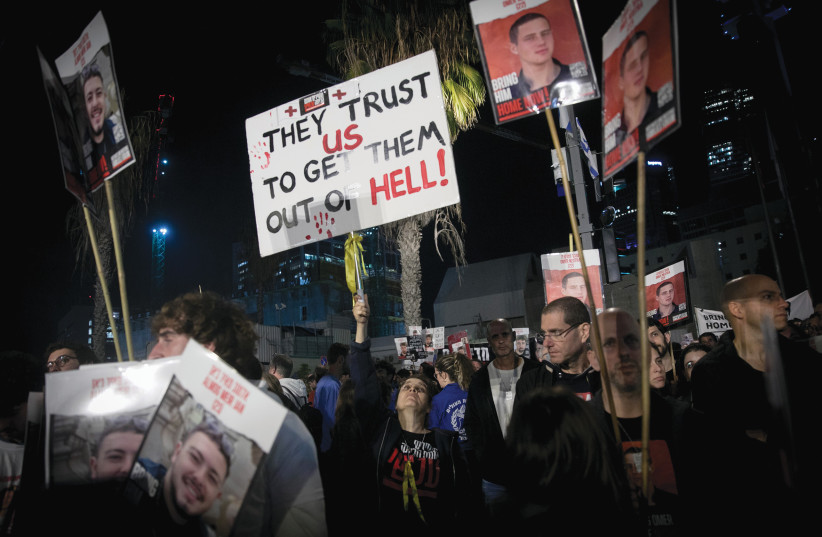After a merciful pause of a few days, it started again on Tuesday morning: the heartbreaking recitation of the names “cleared for publication” of IDF soldiers killed in action the day before.
Sgt.-Maj. (res.) Gavriel Bloom, 27, of Beit Shemesh; Sgt.-Maj. (res.) David Schwartz, 27, of Elazar; Sgt. Roi Tal, 19, of Kfar Yehoshua; Sgt.-Maj. (res.) Yakir Hexter, 26, of Jerusalem.
For a few blessed mornings in early January, the country did not wake up to the crushing news of more fallen soldiers in Gaza.
After over two months of the daily fear of turning on the morning news and hearing of more bereaved families, there was a temporary respite – as if the sun was just barely peeking out from behind very dark clouds. And then, on Tuesday, the dark clouds blocked out the sun once more, and the grim morning recitation of the names reappeared with the report of four killed and six critically wounded in three different incidents in Gaza.
Publishing the names of more fallen soldiers only creates more pain
The pain of the return of that awful wartime ritual was made worse when, a few hours later, the IDF released for publication the names of five more soldiers who were killed in the same incidents. All told, nine soldiers were killed in one horrible day, a devastating toll.
As if that were not enough to batter the country, The Daily Mail, a British tabloid, published photos of four Israeli teenaged girls in Hamas captivity. The paper published “before and after” photos of smiling, hopeful young women and their bloody, beaten faces taken from a Hamas propaganda video filmed a few hours after they were kidnapped on October 7. The pictures ran alongside an interview with the girls’ families – Liri Albag, 18, Karina Ariev, 19, Daniella Gilboa, 19, and Agam Berger, 19 – under a headline that read, “Don’t forget them! Faces of girls STILL held by Hamas.”

And in between the publication of the photos and the cleared-for-publication recitation of the names of additional IDF fallen, more rockets and missiles were fired indiscriminately from Gaza toward Israel with the intent to murder and maim.
That is Israel’s current reality: waging a war, with frightful losses, against a cruel terrorist organization holding 136 Israelis hostage, trying to kill as many civilians as possible.
And here’s the kicker: on Thursday, it is Israel that will be dragged to the International Court of Justice (ICJ) in The Hague, accused of committing genocide.
That’s right: It will be Israel on the defense, and not Hamas, a brutal terrorist organization that has the destruction of Israel as the cardinal tenet of its founding charter and which started the war by attacking the Jewish State and going on an orgy of murder, rape, arson, and mutilation that led to 1,200 people killed, some 240 taken hostage, and entire communities destroyed.
And therein lies the dissonance between what Israelis are feeling and the perspective from the outside. Israelis, traumatized and embattled, feel that they are fighting a quintessential war of no choice, one of – if not the most – just and justifiable wars the country has ever fought. The pictures in The Daily Mail were a small reminder of that.
Yet, part of the world – as evidenced by South Africa’s case against Israel, as witnessed by disruptive pro-Hamas protests in major US cities – sees the victims of Hamas’s aggressions as the aggressors. It’s as if part of the world’s moral compass has gone haywire, as if we live in parallel universes.
This dissonance would, indeed, be unbearable were it not for the sense of justice that most Israelis feel in their country waging this war and the way it is waging this war – regardless of what judges from those beacons-of-light countries such as Russia, China, Somalia, Lebanon, Morocco, South African, and Uganda – all among the 15-judge ICJ panel – may determine at The Hague.
